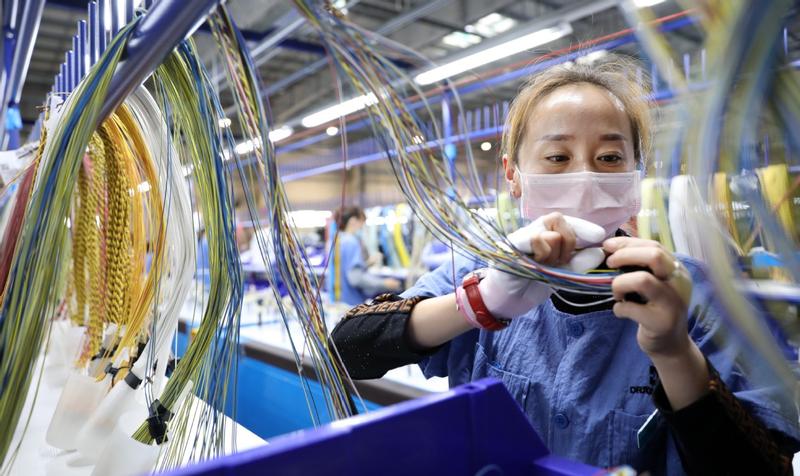 In this undated photo, an employee assembles a wire harness at the workshop of Draexlmaier (Anshan) Wire Harness System Co in Anshan, Liaoning province. The plant is one of five in China operated by Germany-based Draexlmaier Group. (YAO JIANFENG / XINHUA)
In this undated photo, an employee assembles a wire harness at the workshop of Draexlmaier (Anshan) Wire Harness System Co in Anshan, Liaoning province. The plant is one of five in China operated by Germany-based Draexlmaier Group. (YAO JIANFENG / XINHUA)
China became the world's largest recipient of foreign direct investment in 2020, followed by the United States, according to a UN report.
Analysts and business executives said that proved once again China's continuously improving business environment and the great resilience of the country's economy despite the impact of the COVID-19 pandemic.
They said China's effective control of COVID-19, followed by the quick economic recovery, as well as its bright economic outlook and the improvement in the business environment, were the main reasons for the FDI growth last year.
A report by the United Nations Conference on Trade and Development showed that China attracted US$163 billion in foreign direct investment last year, up 4 percent year-on-year
The report, issued on Sunday by the United Nations Conference on Trade and Development, showed that China attracted US$163 billion in FDI last year, up 4 percent year-on-year, while the figure for the US stood at US$134 billion.
ALSO READ: China's 2020 FDI rises 6.2%, nearing trillion yuan
In 2019, the US received US$251 billion in FDI and China attracted US$140 billion.
"China has devoted a great deal of manpower and material resources to pandemic prevention and control, and thus has avoided a wide-ranging dysfunction of its domestic industrial and supply chains, apart from a short breakdown in regional industrial and supply chains during the lockdown of Wuhan in Hubei province," said Zhou Mi, a senior researcher at the Chinese Academy of International Trade and Economic Cooperation in Beijing.
The country's strong economic resilience and surprisingly quick economic recovery from the impact of the coronavirus have also created a stable investment environment for foreign investors, he added.
Rogier Janssens, managing director and general manager of the healthcare arm of Merck China, said the company's healthcare business in China was affected by the impact of the pandemic but recovered quickly.
"The strong resilience of the Chinese economy, the huge potential of China's healthcare market, and the ever-improving business environment have greatly strengthened Merck's confidence in its development in China," he said.
The long-term economic prospects and continuously improving business environment are making China an increasingly attractive FDI destination, experts said.
READ MORE: Chinese market critical to US firms, says business body
Merck's manufacturing facility in Nantong, Jiangsu province, its second-largest manufacturing plant in the world, has benefited from the improving business environment in China, said Janssens.
According to Zhou, China's huge domestic market potential due to the dual-circulation development strategy, which stresses domestic market expansion while seeking greater interplay of the foreign and domestic markets, has reinforced foreign investors' long-term confidence in the Chinese market.
In addition, the structural adjustment of the Chinese economy, featuring innovative new business forms such as online education, in response to social distancing and other issues related to the pandemic, has also offered more business opportunities to foreign investors, he said.
Cui Fan, an international trade and economics professor at the University of International Business and Economics in Beijing, estimated that FDI in China would continue to grow, thanks to the country's new round of higher-level opening-up and deepening supply-side reforms.
Efforts such as reducing investment barriers, broadening market access and expanding free trade area networks, amid ongoing reforms which allow the market to play bigger role in the allocation of production factors, will provide foreign investors with more opportunities and further level the playing field, he said.
However, experts said the country still needs to strengthen innovation capabilities in high-tech industries to overcome bottlenecks, despite progress in some sectors.
According to the UN report, FDI in China's high-tech industries grew by 11 percent and cross-border mergers and acquisitions rose by 54 percent, mostly in the information and communications technology and pharmaceutical sectors.
Contact the writers at liuzhihua@chinadaily.com.cn


